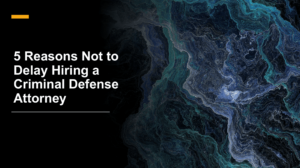Often I speak with people weeks, if not months, after they were arrested or a police investigation has begun. Their first contact with possible defense counsel occurs only after they have been ordered to appear in court on criminal charges. This is a mistake.
 Understanding. A defense attorney can help you understand what you are charged with, explain the law and the legal processes involved with the local courts. “Why have I been charged with Possession of (drug, gun, etc.) when it wasn’t mine?”, “ I didn’t have any alcohol in my system, how can I be charged with a DWI?”, or “I’m allowed to have a gun in my car, this is Texas!” can all be answered by your attorney as it pertains to the facts of your case.Additionally, your attorney is going to be able to explain the bureaucratic process of the legal system in the court in which you are charged. I often tell clients that the county must follow the state’s law but how they follow it is up to them. County courts, especially, are like their own kingdom and their local rules can and will affect your case.
Understanding. A defense attorney can help you understand what you are charged with, explain the law and the legal processes involved with the local courts. “Why have I been charged with Possession of (drug, gun, etc.) when it wasn’t mine?”, “ I didn’t have any alcohol in my system, how can I be charged with a DWI?”, or “I’m allowed to have a gun in my car, this is Texas!” can all be answered by your attorney as it pertains to the facts of your case.Additionally, your attorney is going to be able to explain the bureaucratic process of the legal system in the court in which you are charged. I often tell clients that the county must follow the state’s law but how they follow it is up to them. County courts, especially, are like their own kingdom and their local rules can and will affect your case.- Protecting your rights. This is one of the most important aspects of your defense counsel. How often do I speak with someone AFTER they have already been interviewed by the police? Too often. Remember, anything you say can and will be used against you. Nowhere in that warning does it state that what you say will be used FOR you. We are there to protect you. You should never interview with law enforcement without an attorney.
- Time is of the essence. Know that once the state has begun an investigation, they aren’t waiting for the first court date to be filed to start building their case against you. Waiting to start you defense puts you behind in the investigative process. Are there witnesses or physical evidence that need to be secured to assist in your defense? Give your attorney, your defense team, the most amount of time possible to protect you.
- Beginning before indictment. In felony cases, it is sometimes possible to prevent a case from moving forward past the Grand Jury. The Grand Jury is more of a Quality Control aspect of the legal system for serious charges. If your defense team is able to provide a strong defense against the charge before the Grand Jury, sometimes charges are reduced or even ‘No Billed’ preventing the case from moving forward.In some situations the ability to negotiate with the DA’s Office BEFORE the case goes to the Grand Jury will be an advantage.
- Collateral issues. Often there are collateral issues that are time sensitive. For example, after a DWI arrest there is a short window to request a hearing on whether or not your license will be suspended. When police request a breath or blood sample and you refuse, this starts an administrative suspension of your license. The clock starts ticking from the moment of the refusal and you have only days to respond or your license is administratively suspended.
Ultimately, by securing effective defense counsel at the earliest opportunity, you will help protect yourself, reduce the stress of the unknown, and potentially save you an immense amount of time and money. Give yourself the best defense you can by giving your defense team as much time as possible.
